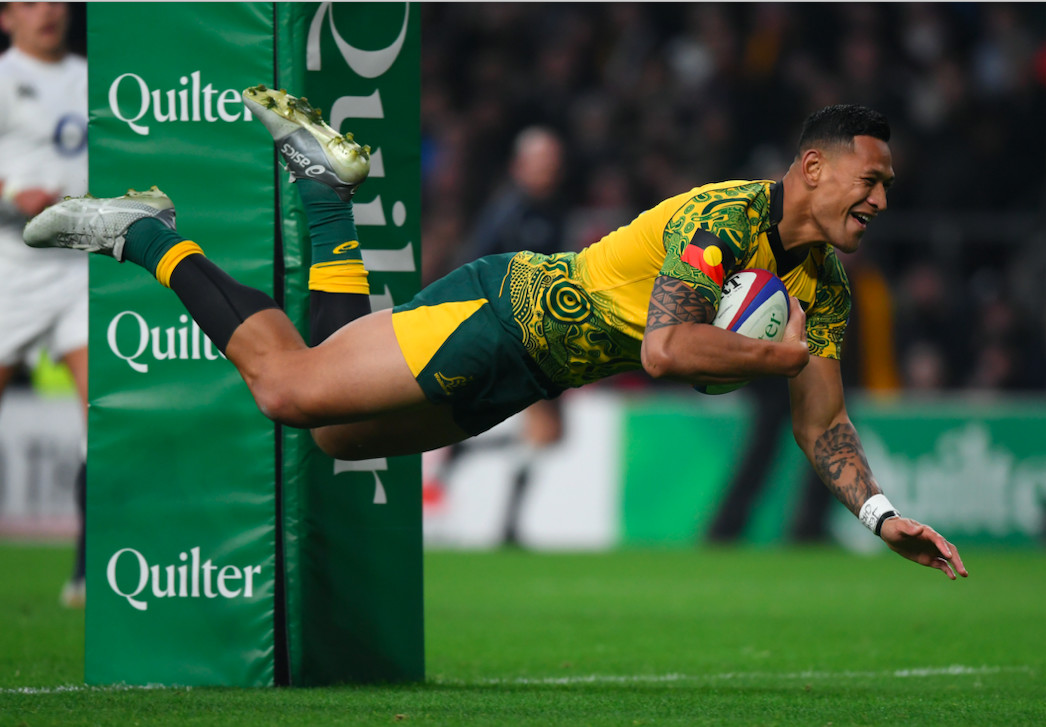
Politics & Society
When sports chatter becomes social commentary

A hearing on Wallabies star Israel Folau’s alleged breach of contract over his social media posts is set to pit Rugby Australia’s code of conduct against issues of fairness and even human rights
Published 30 April 2019
On 10 April, Australian rugby player Israel Folau wrote on Instagram that hell awaits “drunks, homosexuals, adulterers, liars, fornicators, thieves, atheists and idolaters.”
Rugby Australia subsequently announced that his comments breached the game’s Code of Conduct and they would seek to terminate his four-year contract of employment signed only last year and worth a purported A$4million.

Exercising his right under the Code, Mr Folau has sought a full Code of Conduct Committee Hearing on the matter. What are the legal arguments likely to be made at the Hearing, scheduled for May 4?
In seeking to terminate Mr Folau’s contract, Rugby Australia won’t rely on any specific term in the player’s contract. Rather, their arguments will be premised on the general contractual clause that players employed by Rugby Australia must abide by Rugby Australia’s code of conduct (“the Code”).

Politics & Society
When sports chatter becomes social commentary
The preamble to the Code outlines Rugby Australia’s “core values”, including a safe, fair and inclusive environment for all involved in the game.
More specifically, a key clause within the Code states that players must “use Social Media appropriately.” Examples of related breaches of the Code include making “any public comment that would likely be detrimental to the best interests, image and welfare of the Game.”
In addition, there is a clause in the Code that asks players to “treat everyone equally, fairly and with dignity regardless of gender or gender identity, sexual orientation, ethnicity, cultural or religious background, age or disability.”
Rugby Australia’s argument is likely to be that all of the above have been breached by Mr Folau, entitling them to seek unilateral termination of his contract of employment, taking into account that they had previously spoken to the player, on the exact same misbehaviour in April 2018.
In brief, Rugby Australia’s case will be that Mr Folau breached his duty as an employee to obey the lawful reasonable instructions of the employer and, given the repeat nature of the misconduct, termination of contract is justified.

There are likely to be two principal aspects to Folau’s submissions at the Hearing – procedural and substantive unfairness.
On procedural unfairness, Mr Folau may argue that even before a Hearing was arranged, Rugby Australia had prejudged its outcome by declaring that it would seek to terminate his contract of employment. Moreover, he might highlight that, the national team coach, Michael Cheika, in stressing that “the team is king”, had said he would have difficulty ever again selecting Mr Folau for the national team.

Politics & Society
Why ‘winning without counting the costs’ must end
Mr Folau’s substantive unfairness points also seem likely to be twofold – one based on an interpretation of the Code and one, possibly, based on human rights or discrimination law.
On the first element, Mr Folau’s argument may be that the phrase in the Code “use social media appropriately” is overly subjective, and its scope left to be defined at the whim of the employer.
One associated argument here is that Rugby Australia and a number of prominent Australian Rugby internationals used social media to express their support for the country’s same sex or marriage equality referendum in the second half of 2017. At the time Mr Folau stated on social media that in line with his religious beliefs, he would be voting no in the postal plebiscite.
Accordingly, Mr Folau may argue that, although as an organisation Rugby Australia felt it appropriate to take a particular and public stance on a particular social issue of public importance, they are now not extending that organisational privilege to him.

Rugby Australia’s reply here is likely to be crucial. They may well counter that Mr Folau’s activity on social media prior to the disputed Instagram post of April 10 (he posted 52 times on Instagram of which 43 had a religious theme) is evidence of their respect of his right to hold such views and practice them in private.
They are likely to argue that they have only reacted to his April 10 post because his views targeted homosexuality and sexual orientation in a derogatory manner – a clear breach of Rugby Australia’s core value of inclusivity and the player’s Code on social media use.
Central to this whole affair is Mr Folau’s faith.

Politics & Society
Banning cricket cheats: How long is long enough?
Australia doesn’t have a federal bill of rights and neither does New South Wales where the Hearing is to be heard. But Australia has ratified the International Covenant on Civil and Political Rights (ICCPR), and Article 18 of the ICCPR states that everyone has the right to freedom of thought, conscience and religion.
If this point is argued, the issue will be whether the qualifications Rugby Australia have placed on Mr Folau’s freedom to manifest his religious beliefs are legitimate, necessary and proportionate, given that Mr Folau’s views conflict with another fundamental right – the right not to be discriminated against because of one’s sexual orientation. This is protected under Articles 2 and 26 of the ICCPR.
In sum, the point of contention may well be, as is often the case in human rights law, a matter of conflicting rights. To quote Anthony Whealy, former NSW Supreme Court judge: “Clearly the intent [of the Code] is to whole-heartedly “include” the gay community in the rugby movement. But is its intention to “exclude” traditional Christian and other religious beliefs?”
At the federal level, a person who suffers discrimination in employment on the basis of religion has two options. First, that person can make a complaint to the Australian Human Rights Commission. Second, under the Fair Work Act 2009 (Cth), employers are prohibited from terminating an employee’s employment for reasons including their religion (s 772(1)(f)).

NSW’s Anti-Discrimination Act 1977 doesn’t specifically protect religion, though it does prohibit discrimination on the ground of “ethno-religious origin” in sections 4 (definition of “race”) and section 7.
In contrast, Rugby Australia’s Member Protection Policy, which works in tandem with the Code of Conduct, goes further than NSW law by specifically protecting “religion, religious beliefs or activities”. It will be interesting to see whether as part of his defence Mr Folau will counter claim that Rugby Australia has breached its own Member Protection Policy

Arts & Culture
A corrupt contest - how sport is fighting the fixers
If Mr Folau doesn’t succeed at the Hearing, he has a right to appeal and may well decide to pursue the matter in the ordinary courts. Rugby League’s Code of Conduct is currently being argued at the Federal Court in Australia: Jack de Belin is seeking various remedies against the National Rugby League pursuant to its policy to stand down players, who are facing serious criminal charges, pending the outcome of the criminal trial.
Even if Mr Folau succeeds at the Hearing, a point so far underplayed in this whole affair is what is called the concept of mutual trust and confidence between employer and employee. Put simply, employment law jurisprudence recognises that there is little point reinstating a worker unless the parties will be able to work with mutual trust and confidence in each other into the future in a viable, productive way.
Given the unique employment environment of sport, where to quote Mr Cheika, the team is king, it seems reasonable to suggest that even if Mr Folau succeeds in the Hearing, it is most unlikely that he will ever play again for the Wallabies or even the Waratahs.
In fact, if Mr Folau wins, it is likely there will be a settlement to pay out his contract.
The full-time player will then be free to become a full-time preacher.
A version of this article appears in The Conversation.
Banner: Getty Images